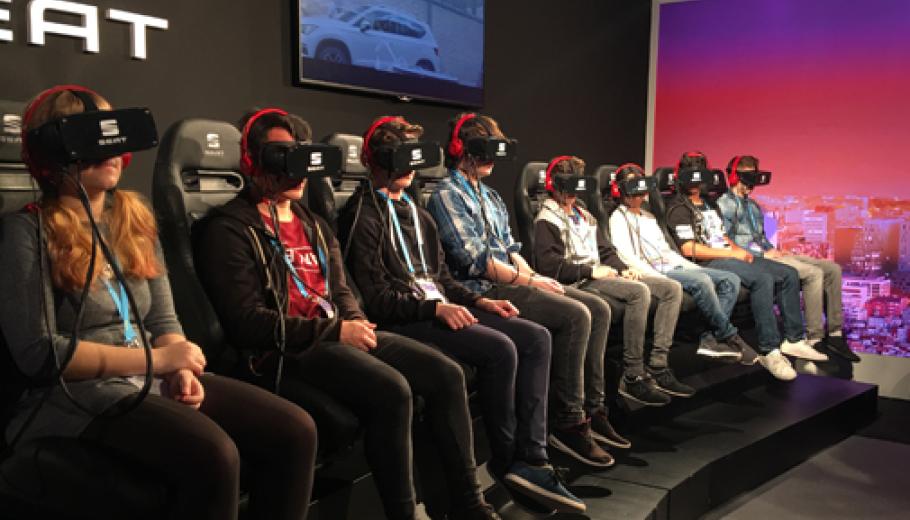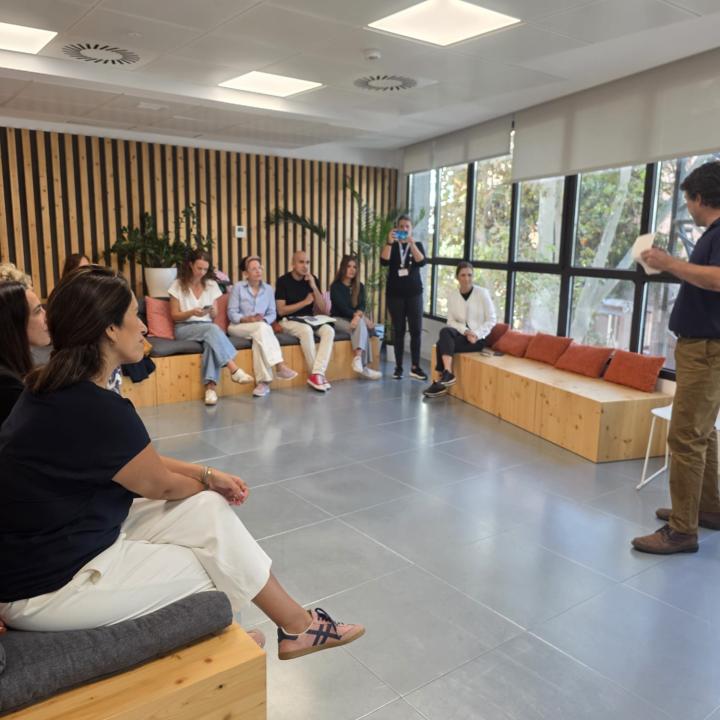Suara Cooperativa will participate in different activities of the Mobile World Congress (MWC), which will allow it to seek alliances with technological companies in the health sector; as well as showing some of their notable projects and their experience in social innovation.
In this context, on Tuesday February 27 Jordi Picas, director of the Innovation area, as well as Bárbara Outeiro, responsible for Open Innovation, and Isabel Garcia, Project Manager for Innovation and the Next Generation Fund, will visit different start-ups in the 4FNY to learn about the latest technologies applied to the social sector.
On Wednesday, February 28, the Innovation team will participate in the Open innovation challenge d'Acció, where it will hold several physical meetings with both Catalan and international start-ups with the aim of consolidating alliances around the two challenges it presents.
The first of these, which is entitled "Harnessing technology to improve well-being and health: accessible and affordable opportunities", aims to find solutions to implement surveillance systems in the homes of people over 65 years of age to be able to preserve their autonomy, improve their quality of life, physical and emotional well-being.
With "The European Assistance Strategy", as the second challenge is called, the organization seeks to weave networks and alliances with international institutions from different fields. These, as in the previous case, seeks to find answers based on social innovation and technology so that people in a situation of dependence can have autonomy to remain at home and carry out activities of daily life, as well as improve their physical well-being , emotional and psychological.
In this context, Suara Cooperativa already has different experiences such as, for example, Suara Map which uses motion sensors to create behavior patterns of the person who resides in a home in order to detect any danger to the person or if he is initiating a process of physical or cognitive deterioration. In addition, this February he started the pilot test of the "Llars Connectades (Connected Homes)" project to install sensors, voice assistants or artificial clocks in the homes of people in a situation of dependency with the intention of improving the security of people in the situation of dependence and combat unwanted loneliness.
Despite already having these experiences underway, Suara Cooperativa hopes that with these two challenges at the Mobile World Congress it will be able to establish new alliances with whom to explore technological and social innovation projects that allow people to live at home even with a situation of dependency triggered by aging.
As part of these two challenges, the people responsible for innovation expect to meet or visit around twenty projects from eight different countries. Specifically, they will hold meetings with a total of nine companies while visiting stands of more disruptive technologies such as, for example, projects that are being carried out with artificial intelligence, analysis and vision with computing, neuroscience, d 'internet of things and connected technologies, robotics, virtual and immersive reality.
It is not the first time that Suara Cooperativa participates in a similar action. At the Integrated Systems Europe (ISE), which took place from January 30 to February 2, brought two challenges, also in the Open Innovation Challange d'Acció. One of them was how to implement immersive, virtual and augmented reality in wellness and care projects; while the second sought to find answers to guarantee an accessible and affordable education for all. In total, they met with 24 companies (both face-to-face and virtually a week before ISE) where they were able to learn about experiences in immersive, augmented and virtual technologies, cyber security, Blockchain, Digital Twins and digital relationship spaces or sensory objects. They have already started working with some of these companies in order to be able to carry out some pilot or concept tests.
"These meetings that we hold both at the ISE and now at the MWC allow us to get closer to start-ups to learn about experiences around the world and try to weave alliances to replicate them here or explore new ones", explains Jordi Picas, director of the Innovation area of Suara Cooperativa. In addition, he adds: "Two of the basic pillars of Suara Cooperativa are mutual cooperation and innovation, which is why spaces like these allow us to achieve them, since we find partners with whom to cooperate in order to find technological answers to existing social challenges".
Participation in presentations and talks
The following day, on February 29, Suara Cooperativa's communications and marketing director, Dúnia Roselló, will participate in the round table "Artificial intelligence for a better social action", which will take place at 1:30 p.m. and is organized by Table of entities of the Third Social Sector of Catalonia, through m4Social and in collaboration with the European Social Network (ESN).
During his intervention at the table, which is part of a day on how to guarantee social rights through artificial intelligence, Roselló will talk about the experiences we have developed at Suara Cooperativa to improve people's lives and the their well-being through artificial intelligence.
Finally, that same day, at 2:30 p.m., Cesc Guimerà and Sílvia Calvet will explain several Suara Cooperativa projects in the "Health Innovation Ecosystem of Catalonia" pavilion, where they will offer the conference "Innovative digital solutions to face current challenges and improve the quality of life of the community".
In detail, in the presentation, Guimerà will talk about the Benestarum project, which seeks to improve the emotional, psychological, physical and economic well-being of working people through an online platform. This allows the person to hold short sessions with specialists such as psychologists, physiotherapists, nutritionists or economic advisors, as well as access group training aimed at improving their well-being.
For its part, Calvet will present the "Casal TV" initiative that, through a device that is installed on the television, people can interact virtually from their homes with other people, follow workshops or participate in gym classes. This project aims to improve the physical and emotional well-being of the elderly or dependent people who participate, as well as combat unwanted loneliness.



